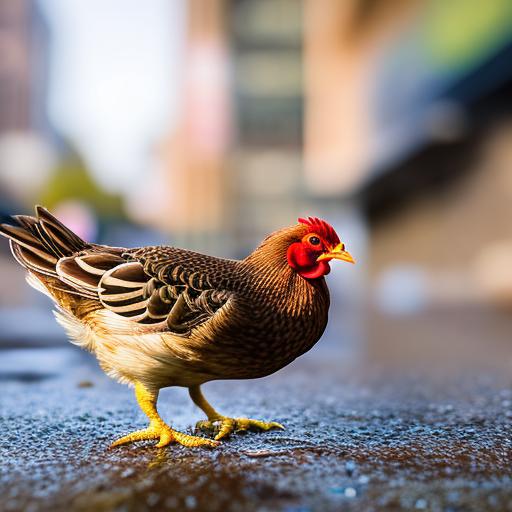Keeping chickens in the city may seem like an unusual concept, but it is becoming increasingly popular among urban dwellers. Urban chicken keeping refers to the practice of raising chickens in residential areas, typically in backyard settings. While some may have reservations about the feasibility of this practice, it is indeed possible and can be a rewarding experience for those who are willing to put in the effort.
One common misconception about urban chicken keeping is that it is noisy and messy. However, with proper care and management, chickens can be kept in a way that minimizes noise and odor. Additionally, many cities have regulations in place to ensure that urban chicken keeping is done responsibly and does not cause any disturbances to neighbors.
Key Takeaways
- Urban chicken keeping is possible and increasingly popular
- Benefits of urban chicken keeping include fresh eggs, pest control, and educational opportunities
- Legal considerations vary by city and may include permits and restrictions on number of chickens
- Some chicken breeds are better suited for urban environments than others
- Housing and space requirements for urban chickens include a secure coop and outdoor run area
The benefits of keeping chickens in the city
There are several benefits to keeping chickens in the city. Firstly, urban chicken keeping can have positive environmental impacts. Chickens are excellent at reducing food waste by consuming kitchen scraps and leftovers. This reduces the amount of organic waste that goes into landfills, which in turn reduces greenhouse gas emissions.
Secondly, raising chickens in the city can be economically beneficial. By producing their own eggs, urban chicken keepers can save money on grocery bills. Additionally, some urban chicken keepers choose to sell their excess eggs or even start small-scale egg businesses, providing them with an additional source of income.
Lastly, consuming fresh eggs from backyard chickens can have health benefits. Eggs from backyard chickens are often considered to be more nutritious than store-bought eggs, as they are typically higher in omega-3 fatty acids and lower in cholesterol. Additionally, knowing exactly where your eggs come from and how the chickens are raised can provide peace of mind for those concerned about food safety.
Legal considerations for urban chicken keeping
Before embarking on urban chicken keeping, it is important to familiarize yourself with the laws and regulations surrounding this practice in your city. While many cities allow residents to keep a small number of chickens, there may be restrictions on the number of chickens allowed, the type of housing required, and the distance between chicken coops and neighboring properties.
In addition to local laws, it is also important to check if any permits or licenses are required for keeping chickens in the city. Some cities may require a permit or license to ensure that urban chicken keepers are following proper sanitation and animal welfare practices.
Choosing the right chicken breed for urban environments
Not all chicken breeds are suitable for urban environments. Some breeds are more adaptable to city living, while others may require more space or have louder vocalizations. When choosing a chicken breed for urban chicken keeping, it is important to consider factors such as noise level, temperament, and space requirements.
Some popular chicken breeds for urban environments include the Rhode Island Red, Australorp, and Sussex. These breeds are known for being docile, adaptable, and relatively quiet. They also tend to be good layers, producing a steady supply of eggs.
Housing and space requirements for urban chickens
Proper housing is essential for the well-being of urban chickens. Chickens require a secure and comfortable coop that protects them from predators and provides adequate ventilation. The coop should also have nesting boxes where the hens can lay their eggs.
In terms of space requirements, each chicken should have at least 4 square feet of coop space and 10 square feet of outdoor space. However, it is important to check local regulations as some cities may have specific requirements regarding coop size and placement.
Feeding and caring for city chickens

Feeding urban chickens is relatively straightforward. Chickens require a balanced diet that includes a combination of commercial feed, kitchen scraps, and fresh greens. It is important to provide them with access to clean water at all times.
In terms of care and maintenance, chickens require regular cleaning of their coop to prevent the buildup of waste and parasites. They also need regular health checks to ensure that they are free from diseases and parasites. Additionally, chickens should be provided with opportunities for exercise and mental stimulation, such as access to a secure outdoor area where they can scratch and peck.
Health and safety concerns for urban chicken owners
While urban chicken keeping can be a rewarding experience, it is important to be aware of the health and safety concerns associated with this practice. Chickens can carry diseases such as salmonella, so it is important to practice good hygiene when handling them and their eggs. Regular cleaning of the coop and proper waste management can help minimize the risk of disease transmission.
Predators can also be a concern for urban chicken owners. It is important to ensure that the coop is secure and predator-proof, with sturdy fencing and locks. Additionally, providing chickens with a safe outdoor area during the day can help reduce the risk of predator attacks.
Noise and odor issues: Addressing community concerns
One common concern among neighbors of urban chicken keepers is the potential for noise and odor issues. However, with proper management, these concerns can be addressed.
To minimize noise, it is important to choose chicken breeds that are known for being relatively quiet. Additionally, providing chickens with enough space, mental stimulation, and attention can help reduce excessive vocalizations.
Odor can be managed by regularly cleaning the coop and properly managing waste. Composting chicken manure can also help reduce odor and provide a valuable source of fertilizer for gardens.
Chicken-keeping resources and support in urban areas
For those interested in urban chicken keeping, there are many resources and support available. Local agricultural extension offices or poultry associations may offer workshops or classes on backyard chicken keeping. Online forums and social media groups dedicated to urban chicken keeping can also provide a wealth of information and support from experienced chicken keepers.
Networking with other urban chicken owners can be particularly valuable, as they can provide firsthand advice and support. They may also be able to recommend local suppliers of chicken feed, bedding, and other necessary supplies.
Is urban chicken keeping right for you?
In conclusion, urban chicken keeping is indeed possible and can be a rewarding experience for those who are willing to put in the effort. It offers several benefits, including environmental, economic, and health benefits. However, it is important to consider the legal considerations, choose the right chicken breed, provide proper housing and care, address health and safety concerns, and be mindful of noise and odor issues.
If you are considering urban chicken keeping, take the time to research and educate yourself on the best practices and requirements for your specific location. Consider whether you have the time, resources, and commitment to properly care for chickens. And most importantly, reach out to other urban chicken keepers for advice and support. With proper planning and care, urban chicken keeping can be a fulfilling and sustainable hobby.
If you’re considering keeping chickens in the city, you may also be interested in learning about the possibility of raising guinea fowl alongside your chickens. Guinea fowl can be a great addition to your urban flock, as they are excellent foragers and can help control pests in your backyard. To find out more about whether guinea fowl can live with chickens, check out this informative article on Poultry Wizard: Can Guinea Fowl Live with Chickens? Additionally, if you’re looking for tips on building a chicken coop that is portable and easy to move around, this article on Poultry Wizard provides some helpful insights: Chicken Coop Portage: A Guide to Building a Portable Chicken Coop. Lastly, if you’re interested in breeding quail and want to know if quails sit on their eggs like chickens do, this article on Poultry Wizard has all the answers: Do Quails Sit on Their Eggs?
FAQs
What are the benefits of keeping chickens in the city?
Keeping chickens in the city can provide a source of fresh eggs, fertilizer for gardens, and entertainment for families. Chickens can also help control pests and weeds in the yard.
What are the legal requirements for keeping chickens in the city?
The legal requirements for keeping chickens in the city vary depending on the location. Some cities have specific regulations regarding the number of chickens allowed, coop size and placement, and noise restrictions. It is important to check with local authorities before keeping chickens in the city.
What kind of space do chickens need?
Chickens need a coop for shelter and a run for exercise. The coop should be large enough for the number of chickens and provide protection from predators. The run should be fenced and provide at least 10 square feet of space per chicken.
What do chickens eat?
Chickens eat a variety of foods including commercial feed, grains, fruits, vegetables, and insects. It is important to provide a balanced diet for chickens to ensure their health and egg production.
What are the health risks of keeping chickens in the city?
Chickens can carry diseases such as salmonella, which can be transmitted to humans through contact with their feces or eggs. It is important to practice good hygiene when handling chickens and their eggs to reduce the risk of illness.
What are some common problems with keeping chickens in the city?
Common problems with keeping chickens in the city include noise complaints from neighbors, predators such as raccoons and foxes, and zoning regulations. It is important to address these issues before keeping chickens in the city.
Meet Walter, the feathered-friend fanatic of Florida! Nestled in the sunshine state, Walter struts through life with his feathered companions, clucking his way to happiness. With a coop that’s fancier than a five-star hotel, he’s the Don Juan of the chicken world. When he’s not teaching his hens to do the cha-cha, you’ll find him in a heated debate with his prized rooster, Sir Clucks-a-Lot. Walter’s poultry passion is no yolk; he’s the sunny-side-up guy you never knew you needed in your flock of friends!







